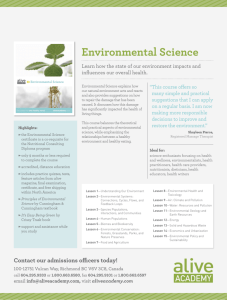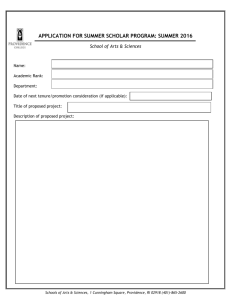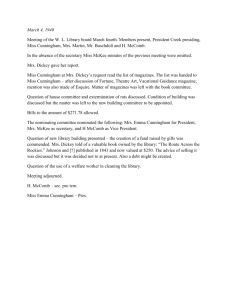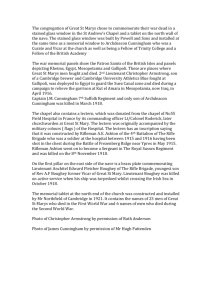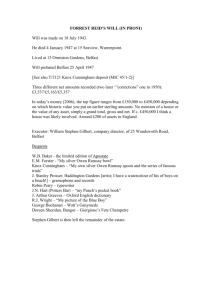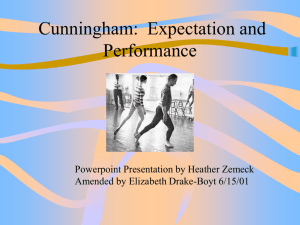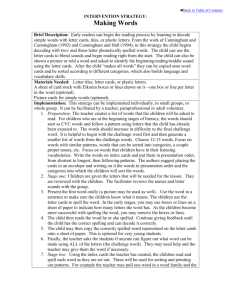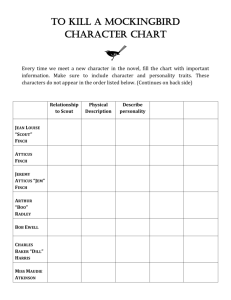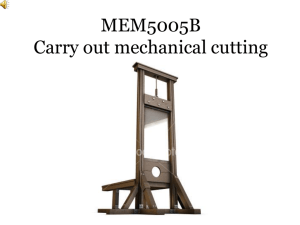PS-564 Human Resources Management
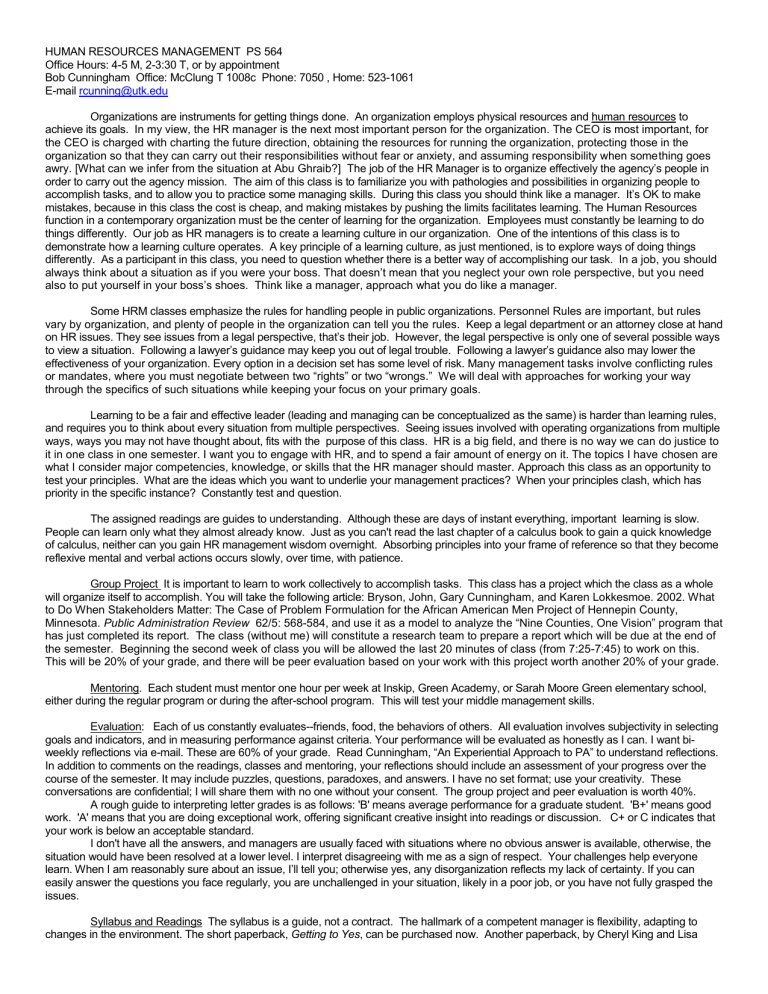
HUMAN RESOURCES MANAGEMENT PS 564
Office Hours: 4-5 M, 2-3:30 T, or by appointment
Bob Cunningham Office: McClung T 1008c Phone: 7050 , Home: 523-1061
E-mail rcunning@utk.edu
Organizations are instruments for getting things done. An organization employs physical resources and human resources to achieve its goals. In my view, the HR manager is the next most important person for the organization. The CEO is most important, for the CEO is charged with charting the future direction, obtaining the resources for running the organization, protecting those in the organization so that they can carry out their responsibilities without fear or anxiety, and assuming responsibility when something goes awry. [What can we infer from the situation at Abu Ghraib?] T he job of the HR Manager is to organize effectively the agency’s people in order to carry out the agency mission. The aim of this class is to familiarize you with pathologies and possibilities in organizing people to accomplish tasks, and to allow you to practice some managing skills. During this class you should think like a manager. It’s OK to make mistakes, because in this class the cost is cheap, and making mistakes by pushing the limits facilitates learning. The Human Resources function in a contemporary organization must be the center of learning for the organization. Employees must constantly be learning to do things differently. Our job as HR managers is to create a learning culture in our organization. One of the intentions of this class is to demonstrate how a learning culture operates. A key principle of a learning culture, as just mentioned, is to explore ways of doing things differently. As a participant in this class, you need to question whether there is a better way of accomplishing our task. In a job, you should always think about a situation as if you were your boss. That doesn’t mean that you neglect your own role perspective, but you need also to put yourself in your boss’s shoes. Think like a manager, approach what you do like a manager.
Some HRM classes emphasize the rules for handling people in public organizations. Personnel Rules are important, but rules vary by organization, and plenty of people in the organization can tell you the rules. Keep a legal department or an attorney close at hand on HR issues. They see issues from a legal perspective, that’s their job. However, the legal perspective is only one of several possible ways to view a situation. Following a lawyer’s guidance may keep you out of legal trouble. Following a lawyer’s guidance also may lower the effectiveness of your organization. Every option in a decision set has some level of risk. Many management tasks involve conflicting rules or mandates, where you must neg otiate between two “rights” or two “wrongs.” We will deal with approaches for working your way through the specifics of such situations while keeping your focus on your primary goals.
Learning to be a fair and effective leader (leading and managing can be conceptualized as the same) is harder than learning rules, and requires you to think about every situation from multiple perspectives. Seeing issues involved with operating organizations from multiple ways, ways you may not have thought about, fits with the purpose of this class. HR is a big field, and there is no way we can do justice to it in one class in one semester. I want you to engage with HR, and to spend a fair amount of energy on it. The topics I have chosen are what I consider major competencies, knowledge, or skills that the HR manager should master. Approach this class as an opportunity to test your principles. What are the ideas which you want to underlie your management practices? When your principles clash, which has priority in the specific instance? Constantly test and question.
The assigned readings are guides to understanding. Although these are days of instant everything, important learning is slow.
People can learn only what they almost already know. Just as you can't read the last chapter of a calculus book to gain a quick knowledge of calculus, neither can you gain HR management wisdom overnight. Absorbing principles into your frame of reference so that they become reflexive mental and verbal actions occurs slowly, over time, with patience.
Group Project It is important to learn to work collectively to accomplish tasks. This class has a project which the class as a whole will organize itself to accomplish. You will take the following article: Bryson, John, Gary Cunningham, and Karen Lokkesmoe. 2002. What to Do When Stakeholders Matter: The Case of Problem Formulation for the African American Men Project of Hennepin County,
Minnesota. Public Administration Review 62/5: 568-584, and use it as a model to analyze th e “Nine Counties, One Vision” program that has just completed its report. The class (without me) will constitute a research team to prepare a report which will be due at the end of the semester. Beginning the second week of class you will be allowed the last 20 minutes of class (from 7:25-7:45) to work on this.
This will be 20% of your grade, and there will be peer evaluation based on your work with this project worth another 20% of your grade.
Mentoring. Each student must mentor one hour per week at Inskip, Green Academy, or Sarah Moore Green elementary school, either during the regular program or during the after-school program. This will test your middle management skills.
Evaluation: Each of us constantly evaluates--friends, food, the behaviors of others. All evaluation involves subjectivity in selecting goals and indicators, and in measuring performance against criteria. Your performance will be evaluated as honestly as I can. I want biweekly reflections via e-mail. These are 60% of your gr ade. Read Cunningham, “An Experiential Approach to PA” to understand reflections.
In addition to comments on the readings, classes and mentoring, your reflections should include an assessment of your progress over the course of the semester. It may include puzzles, questions, paradoxes, and answers. I have no set format; use your creativity. These conversations are confidential; I will share them with no one without your consent. The group project and peer evaluation is worth 40%.
A rough guide to interpreting letter grades is as follows: 'B' means average performance for a graduate student. 'B+' means good work. 'A' means that you are doing exceptional work, offering significant creative insight into readings or discussion. C+ or C indicates that your work is below an acceptable standard.
I don't have all the answers, and managers are usually faced with situations where no obvious answer is available, otherwise, the situation would have been resolved at a lower level. I interpret disagreeing with me as a sign of respect. Your challenges help everyone learn. When I am reasonably sure about an issue, I’ll tell you; otherwise yes, any disorganization reflects my lack of certainty. If you can easily answer the questions you face regularly, you are unchallenged in your situation, likely in a poor job, or you have not fully grasped the issues.
Syllabus and Readings The syllabus is a guide, not a contract. The hallmark of a competent manager is flexibility, adapting to changes in the environment. The short paperback, Getting to Yes , can be purchased now. Another paperback, by Cheryl King and Lisa
Zanetti, is not yet available, but should be available in another 6 weeks. Other items are available through electronic reserve. The reading load is not balanced by week. Some weeks have heavy reading, so take note and plan in advance. I will add or subtract as we go along.
The list of readings is not yet complete. You are expected to have read the materials and thought about the questions prior to class.
Jan 24 Knowledge and Decisions
Cunningham Experiential Learning in PA
Weick, Karl Sensemaking , Ch1. How one develops answers and problems.
Cunningham, Robert and Louis Weschler. 2002. Theory and the Public Administration Student/Practitioner. Public Administration Review
62/1: 104-111.
Cunningham, Bob. 2004. Please Don’t Teach Max Weber….Yet. October: SECoPA.
Cunningham and Olshfski Cultural Environment and the Decision Process Model
Hambrick, D. and Cannella, A. 1989. Strategy Implementation as Substance and Selling. Academy of Management Executive 3/4: 78-85.
Questions and Issues for today.
Miss Daisy, Distinguishing various kinds of knowledge and two approaches to making decisions.
Which is more comfortable for you —1-the SRA model or 2-the model from the Cunningham/Olshfski reading? What are the implications of selecting one model over the other? Are there occasions under which you would use one rather than the other?
Directive vs facilitative leadership, Blind walk, sugar cubes
Kinds of knowledge
Jan 31 Communicating , Negotiating
The Art of Listening
Tannen: The Power of Talk
Fisher and Ury Getting to Yes
Communicating facts; communicating feelings
Practicing listening and communicating. Practicing negotiating. Telepole. Difficult situations.
Feb 7 Paradox
Cunningham, Paradox
J. Kevin Barge A Relational Perspective Toward Inquiry
Having read the Cunningham and Barge papers, how has your thinking changed about problem-solving strategies and processes that managers should follow?
Write a paradox poem to read in class, Apply the principles of paradox and the relational perspective in negotiating, Difficult situations, grant negotiating,
Feb 14 Ethics, Hiring simulation
Gortner, Ch1 Ethics and Public Managers
ASPA ethics statement (can be found on the back of every PAR, or on the webset (www.ASPAnet.org)
Christine Ludowise, Steve Roberts, and Robert Cunningham Efficiency As An Ethical Mandate
Ethics Cases
Write down and share an ethical situation that has troubled you. Feel free to change facts to disguise the case.
Tourism Authority
—20 vita. Pick the 5 you won’t consider, the 10 you will consider, and the top 5. Give reasons for the top and bottom
5. County Executive —Jacek, Vance, Kelly, and Kerner
Feb 21 Spirituality, appreciative inquiry
Breakfast at the Victory
Appreciative Inquiry
– Whitney (On PS-340 reserve)
Barge and Oliver
Parker Palmer
Quinn, Robert. 1996. Deep Change: Discovering the Leader Within San Francisco: Jossey-Bass. Ch7
Drucker
Video in Class? Write a series of discussion questions?
Feb 28 Motivating/Compensating/Appraising
Kohn, Alfie. 1993. Why Incentive Plans Cannot Work. Harvard Business Review 71/5: 54-63.
Comments (HBR 71/6: 37-49)
Abrashoff, D. Michael. 2001. Retention Through Redemption. Harvard Business Review February, 137-141.
Peiperl, Maury. 2001. Getting 360 Feedback right. Harvard Business Review January: 142-147.
Motivational speech. You will be given a role the previous week, and you are to prepare a 3-minute motivational presentation.
Pay for performance?? Developing open, performance-based means of appraisal. Elasticities? There are no good theories on how to pay. There are some bad theories.
Family-friendly policies are simply ways to attract employees. Not new. UT
—reduced tuition for kids, football tickets, prestige, telecommuting
Gainsharing
—but look out for load-shifting
Problems with pay for performance? Singular focused and weakens creativity, load shedding-pick the easy fruit, interpersonal conflict, hierarchical, cover rather than improve weaknesses, perception of manipulation
Should appraisal and compensation be linked or separated?
How frequent should appraisal occur? Group vs indiv?
Motivation: what works; what does not work
Managing boss
SPEECH
Mar 7 Accountability, performance measurement, mgt levels
– Talk to a public manager about how he or she measures performance [The manager you talk to must be responsible for filling out formal performance evaluations on at least two subordinates.]
Performance Measurement Symposium, PPMR
Kelly, Janet. 2005. The Dilemma of the Unsatisfied Customer in a Market Model of Public Administration. Public Administration Review
65/1: 76-84.
O’Connell, Lenahan. 2005. Program Accountability as an Emergent Property: The Role of Stakeholders in a Program’s Field.
Public
Administration Review 65/1: 85-93
Koppell, Jonathan. 2005. Pathologies of Accountability: ICANN and the Challenge of “Multiple Accountabilities Disorder.” Public
Administration Review 65/1: 94-108.
Compare the literature to the practice
Competency-based assessment
In basket?
Mar 14 Leading and Teams
M*A*S*H Ck this movie from your video store or view it in the UT library. Describe the effective leadership you saw exhibited here. Is this organization effective; and if so, why?
Collins, Jim. 2001. Level 5 Leadership. Harvard Business Review January 68-76.
Druskat, Vanessa and Steven Wolff. 2001. Building the Emotional Intelligence of Groups. Harvard Business Review March 81-90.
Wetlaufer, Susie
Dr. Clay, Dr. Glass
Broken Squares
Two written assignments. 1-a short story (1-2 pp) of a situation that you have observed where leadership was demonstrated.
2-a problem situation in an organization in which you were involved, or which you know about. For both, feel free to change names if necessary to protect confidences.
Think about the leadership characteristics presented by each author. Where do they come from? How can they be obtained? How can you tell whether someone has them? Leadership is a concept fraught with paradox and incomplete understanding. Write down the qualities you think important for a leader. Leaders vs heroes--What is the difference?
Mar 21 Spring Break
Mar 28 Knowing yourself, Gary Klukken, Counseling Center
Apr 4 DISCRIMINATION and MENTORING, Marva Rudolph, Director of DRI
Griggs, Lewis and Lente-Louise Louw. 1995. Diverse Teams. Training and Development October: 24-29.
Leslie, Bruce. 1995. Life Lessons in Disability Law. Training and Development July: 41-44.
McIntosh, Peggy. 1990. White Privilege: Unpacking the Invisible Knapsack. Independent School 31-34.
Hayashi, Alden. 2001. Mommy-Track Backlash. Harvard Business Review March, 33-40.
Cunningham, B. Reframing Diversity .
GeigerDumond, Adrianne and Boyle, Susan. 1995. Mentoring: A Practitioner’s Guide. Training and Development 49/3: 51-54.
Bell, Chip. 1997. The Bluebirds’ Secret: Mentoring with Bravery and Balance.
Training and Development 51/2: 31-33.
Are Emily and Greg more employable than LaKisha and Jamal?
Discrimination is in everything, and it isn’t necessarily bad. Every system has bias.
Apr 11 Contracting out (contractor side)
— Lee Thomas, Supt of LMHI, and associates.
Apr 18 Contracting out (govt side)
—contact Mike Harkleroad 425-4458
Apr 25 Transformative PA
—King and Zanetti
This book is not yet published. Cheryl King is a leading PA scholar; Lisa Zanetti received her doctorate from UT about 10 years ago.
The book will be available around the first of March.
Reprimand case

